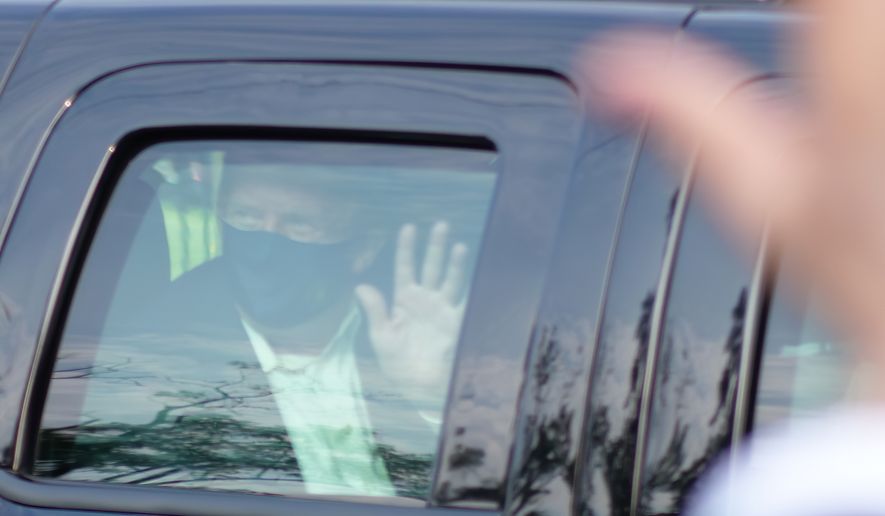OPINION:
After being diagnosed with COVID-19 and hospitalized at Walter Reed Medical Center, President Trump has, much to the relief of the U.S. public and our allies, returned to the White House.
But even as the president resumes his duties full-time as head of state and campaigns vigorously for a second term, U.S. national security officials must remain on the watch, tracking and deterring ruthless adversaries seeking to turn the president’s illness to their advantage.
I learned first-hand at CIA the importance of collecting intelligence on foreign leaders when my colleagues and I charted the health of the late Russian President Boris Yeltsin, who spent months in the hospital after undergoing quintuple heart bypass surgery in 1996.
North Korean leader Kim Jong-un’s recent months-long absence from public view also presented a significant challenge to outside analysts, given Pyongyang’s opaque and tightly-regimented society.
Our enemies — and even our allies — consider the president of the United States their highest priority information collection target. Foreign governments scour open-source media reporting and the president’s own tweets and videos for clues about his health. They also engage in full-throttled espionage to fill knowledge gaps.
We should expect our adversaries in particular ruthlessly to focus on questions such as when the president last tested negative for coronavirus; the side effects of any medication he is taking; and any contingency and continuity-of-government planning being done as Mr. Trump recovers.
Foreign governments use this information not just to inform their bilateral engagement with the U.S., but also to probe for any exploitable weakness or distraction in the conduct of American foreign policy.
Russia and China would never miss such an opportunity to weaponize this element of the COVID-19 narrative, with an eye to disparaging our political process. Democracy, for leaders like Vladimir Putin and Xi Jinping, is an existential threat. While they impose Orwellian Big Brother control over their own populations, both China and Russia can use their state-controlled media to portray the U.S. as politically unstable and unable to counter the most devastating impacts of the coronavirus.
Russia is the most sophisticated practitioner of information operations designed to shape public opinion. Mr. Putin deploys a range of platforms, starting with the Kremlin’s propaganda arm RT, formerly known as Russia Today, which the Trump administration ordered to register formally as a foreign agent in 2017.
Having outsourced social media influence operations to the Kremlin-linked Internet Research Agency, Mr. Putin also mounts “discoverable” influence operations that barely bother to hide the Kremlin’s controlling hand. Seasoned in the art of intelligence from his KGB training, Mr. Putin has used cyberspace as a propaganda accelerant designed to inflame already red-hot partisan debates here.
Given that our upcoming election is already in the Kremlin’s crosshairs, the U.S. should manage the aftermath of President Trump’s bout with COVID-19 with three courses of action:
First, the intelligence community must step up its relentless collection of indications and warnings of threats to U.S. national security in key flash points around the world, including, but not limited, to North Korea, Taiwan and Iraq. Those are the most likely places where our adversaries might test the readiness and effectiveness of the U.S. ability to defend its security interests.
Second, especially in light of outbreak of cases and quarantining at the highest levels of both the Pentagon and White House, U.S. officials need a consistent message to reassure our citizens and our allies and deter our enemies. In addition to public pronouncements, we should expect Secretary of State Mike Pompeo and his dedicated team of diplomats to deliver behind-the-scenes warnings to adversaries that the U.S. remains as committed as ever to defend our national security interests. Sen. Marco Rubio, Florida Republican, rightly emphasized that any adversary who sees Mr. Trump’s illness “as an opportunity to test the United States would be making a grave mistake.”
Third, the Trump administration should be as transparent as possible about the president’s illness and recuperation to avoid creating vulnerable attack space for foreign adversaries to sow confusion. Noting the “significant increase in conspiracy theories and outrageous claims” since the president’s diagnosis, Mr. Rubio sagely argued for “frequent, detailed, and transparent” updates from the White House while remaining “skeptical of outlandish rumors.”
• Daniel N. Hoffman is a retired clandestine services officer and former chief of station with the Central Intelligence Agency. His combined 30 years of government service included high-level overseas and domestic positions at the CIA. He has been a Fox News contributor since May 2018. Follow him on Twitter @DanielHoffmanDC.




Please read our comment policy before commenting.